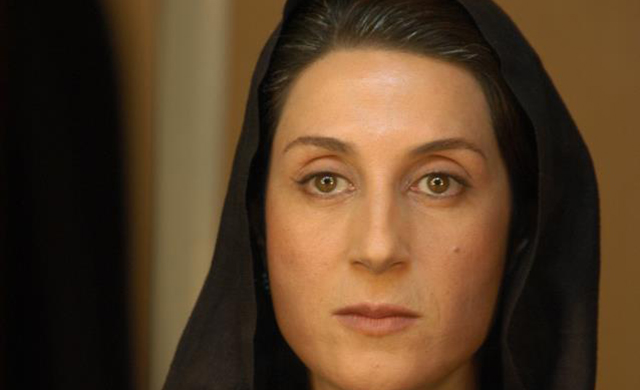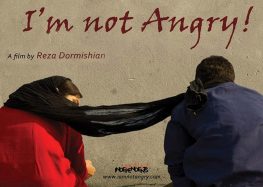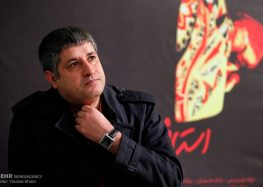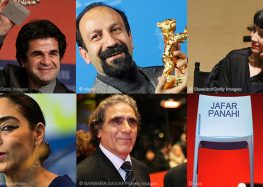Iranian Officials Condemn Radical Mob’s Attack On Top Actress

An attack last week on one of Iran’s most famous actresses by hardline vigilantes has been condemned by the Ministry of Culture and Islamic Guidance and the Rouhani administration’s top official in charge of women’s affairs.
A mob attacked a car carrying Fatemeh Motamed-Aria as she was on her way to the screening of the film, “Yahya Did Not Stay Silent,” in Kashan, a city in Iran’s Isfahan province, on January 29.
Motamed-Aria caused an uproar among Iranian religious conservatives when she attended the 2010 Cannes festival without a head scarf.
The day after the attack, Kashan’s Friday prayer leader called for a “day of mourning” in protest against Motamed-Aria’s appearance.
“The government’s position in regards to this incident is clear,” said Culture and Islamic Guidance Minister Ali Jannati. “We support artists, in particular those like Mrs. Motamed-Aria who are well-known and respected artists.”
“We certainly do not condone what happened [in Kashan],” said Jannati, but added that “In some places we have no authority.”
“There are powerful, influential elements who act on their own,” he added.
The attack against Motamed-Aria, who starred in the recently banned “Parinaaz,” took place even though the Ministry of Culture and Islamic Guidance, which can allow or prohibit any artistic or culture event from occurring, had granted permission for the screening in Kashan with the director and cast members present.
The Vice President for Women and Family Affairs, Shahindokht Mowlaverdi, also condemned the religious ultraconservatives who attacked Motamed-Aria.
“No religious or common law can justify attacking a Muslim Iranian woman with such indignities, especially under the guise of defending religion,” said Mowlaverdi.
“Won’t this kind of aggressive behavior pave the way for more young artists to leave the country and join satellite channels?” she asked.
The many limitations on women in Iran’s film industry have been well documented in the past 37 years since the Islamic Revolution. But the attack in Kashan has even shocked government and industry officials not known for their defense of female artists.
Furious Protestors
The film’s director, Kaveh Ebrahimpour, described seeing a crowd of “about 50 or 60 people” upon his arrival who had gathered in front of the cinema shouting against the film and against Motamed-Aria.
“They were calling on her to leave the city. We were forced to enter from the back door,” Ebrahimpour told ILNA news agency.
“When the thugs realized we were going to go inside the theater, they attacked us and shouted really ugly bad words. They insulted Ms. Motamed-Aria with things I had never heard before,” he said. “Then, with help from the police, we were able to get inside the hall.”
Ebrahimpour continued, “When the event came to an end, we had a difficult time leaving the hall, even with police help. We quickly got into our car and left. As we got into the car, two men jumped on the roof and tried to break the windows but they were stopped by the police. Then a number of motorcyclists chased our car but they couldn’t reach us.”
Motamed-Aria wanted the protesters to come inside the theater and participate in a debate, noted Ebrahimpour, but they refused.
Day of Mourning
The following day Ayatollah Abdolnabi Namazi, Kashan’s Friday prayer leader, declared Motamed-Aria’s presence in the city “a great calamity” and called for a day of mourning on Friday, February 5.
“Everyone should know Kashan’s place in the history of Shiism,” said Namazi. “Kashan has no tolerance for immoral gatherings.”
Namazi rejected the legitimacy of the event’s permit issued by the Ministry of Culture and Islamic Guidance and even called on the Judiciary to arrest and punish the officials who stood their ground and prevented protesters from stopping the event.
He also accused Motamed-Aria of having “a history of removing her hijab,” adding that “Her clothes appeared so [inappropriate] that they tried to hide her in the street so no one would see her in that condition.”
Motamed-Aria, 54, has starred in many films by Iran’s most celebrated directors, including Bahram Beyzaie, Rakhshan Bani-Etemad, Bahman Farmanara and Mohsen Makhmalbaf.
A supporter of former reformist President Mohammad Khatami (1997-2005), Motamed-Aria also supported moderate politician Mir Hossein Mousavi’s unsuccessful presidential bid in 2009 and appeared in one of his campaign ads.
Mousavi has been under house arrest since February 14, 2011.
In September 2009, Motamed-Aria was prevented from leaving the country to attend the Oscars in the US to discuss the state of Iranian cinema. Her ban was seen as punishment for her support of Iran’s Green Movement, which grew out of peaceful protests against Mahmoud Ahmadinejad’s disputed 2009 presidential election.
In 2010, Motamed-Area attended the Cannes Film Festival without wearing a hijab over her head. The government reacted by banning her from working, which lasted until President Hassan Rouhani’s election in 2013.
Film Industry Reacts
Reza Mirkarimi, the head of the House of Cinema, Iran’s largest professional film association, reacted to the incident in Kashan by writing a letter to the city’s Friday prayer leader assuring him that nothing wrong or inappropriate occurred during Motamed-Aria’s appearance at the event.
“My professional responsibility compelled me to investigate this matter and I came to the conclusion that nothing immoral happened during the presence of this experienced and respected member of Iranian cinema,” wrote Mirkarimi. “In fact, evidence shows that the attack incident was planned in advance.”
Hojatollah Ayyubi, the head of the Ministry of Culture and Islamic Guidance’s film division, also expressed regret that “some people are instigating these thugs against our country’s artists.”
Actor Reza Kianian called the attackers “terrorists,” according to Khabar Online.
“Terrorism is thuggery’s twin,” he said. “Terrorism is when a bunch of young people join ISIS and threaten the world, or attack embassies, or speakers.”
In a political jab against Namazi, film director Mohsen Amir Yousefi agreed with the Friday prayer leader’s declaration of a day of mourning, but said it should be dedicated to the city’s “lack of hospitality.”
In a post on Instagram, actor Parviz Parastui described the behavior towards Motamed-Aria as “ugly and disgraceful,” adding that he was “disappointed because Motamed-Aria is not the enemy but rather a very good artist.”
“It would be good if we could recognize the difference,” he said.
In previous years, several female actors have been reprimanded for the way they have dressed at events abroad. Two officials called for actress Leila Hatami’s prosecution because she shook hands with the 84-year-old head of the Cannes Film Festival in 2014.
A year earlier the Oscar winning director Asghar Farhadi was publicly scolded by hardliners for shaking Madonna’s hand when receiving an award at the Golden Globes.
Golshifteh Farahani, who moved to France in 2009 to pursue her acting career, told the BBC in an interview that before leaving Iran, she was told by Intelligence Ministry interrogators that she was no longer wanted in the country.
“They told me, ‘You are our problem. You should not be in this country,’” she said.






